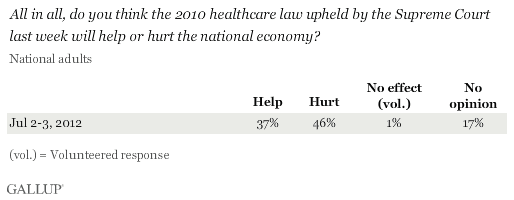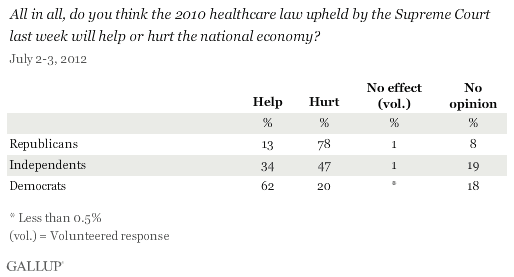PRINCETON, NJ -- Americans are more likely to say the 2010 healthcare law upheld by the Supreme Court last week will hurt the national economy (46%) rather than help it (37%), while 18% say they don't know or that it will have no effect.

Healthcare spending accounts for between one-sixth and one-fifth of the U.S. gross domestic product. Thus, the overhaul of the U.S. healthcare system that the Affordable Care Act provides will certainly have an effect not just on the U.S. healthcare system, but on the U.S. economy more broadly. Not even economists who study this for a living can estimate the ACA's precise impact on the U.S. economy over the years ahead, given that the bill is huge and multifaceted, and carries with it many assumptions about cost savings and how the healthcare system will react to its provisions. Additionally, while some of the law's provisions have gone into effect, the majority of them have yet to be implemented, providing no real-world empirical evidence on its full economic impact.
Average Americans are certainly in no better position than economists to know exactly how the legislation will affect the economy, but their assumptions and perceptions have political repercussions nevertheless. And at this point, Americans' views on the economic impact of the ACA are more negative than positive.
Views of the economic impact of the ACA are, as is true with everything else about the legislation, bound up with politics. Republicans, who generally oppose the ACA, overwhelmingly think it will hurt the economy, while Democrats, who generally favor it, think it will help. Independents tilt toward the "hurt" rather than the "help" position.

Democrats are a little less likely to say the ACA will help the economy than Republicans are to say it will hurt it. The fact that independents are more likely to say it will hurt than help the economy -- by a 14-percentage-point margin -- is important in the context of the current presidential election.
Implications
Proponents of the ACA argue that it has many benefits, including in particular decreasing the number of Americans who don't have health insurance. Opponents argue against it partly on philosophical grounds, decrying the ACA's reliance on government to control this personal aspect of Americans' lives. The practical impact of the law on the healthcare system and the economy will not be fully known until it has been place and medical providers and consumers react to the changes.
But with the economy continuing to top the list of Americans' perceived most important problems facing the country, the impact of the ACA on the national economy is a major consideration. The current data show that Americans are as divided on the question of the ACA's economic impact as they are on the bill itself, heavily along political lines. But Americans' overall tilt toward the view that the ACA will hurt the economy may be a liability for President Obama and the ACA's proponents.
Survey Methods
Results for this Gallup poll are based on telephone interviews conducted July 2-3, 2012, on the Gallup Daily tracking survey, with a random sample of 1,061 adults, aged 18 and older, living in all 50 U.S. states and the District of Columbia.
For results based on the total sample of national adults, one can say with 95% confidence that the maximum margin of sampling error is ±4 percentage points.
Interviews are conducted with respondents on landline telephones and cellular phones, with interviews conducted in Spanish for respondents who are primarily Spanish-speaking. Each sample includes a minimum quota of 400 cell phone respondents and 600 landline respondents per 1,000 national adults, with additional minimum quotas among landline respondents by region. Landline telephone numbers are chosen at random among listed telephone numbers. Cell phone numbers are selected using random-digit-dial methods. Landline respondents are chosen at random within each household on the basis of which member had the most recent birthday.
Samples are weighted by gender, age, race, Hispanic ethnicity, education, region, adults in the household, and phone status (cell phone only/landline only/both, cell phone mostly, and having an unlisted landline number). Demographic weighting targets are based on the March 2011 Current Population Survey figures for the aged 18 and older non-institutionalized population living in U.S. telephone households. All reported margins of sampling error include the computed design effects for weighting and sample design.
In addition to sampling error, question wording and practical difficulties in conducting surveys can introduce error or bias into the findings of public opinion polls.
View methodology, full question results, and trend data.
For more details on Gallup's polling methodology, visit www.gallup.com.
